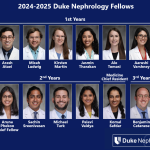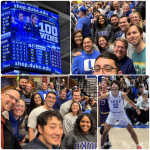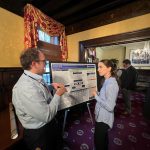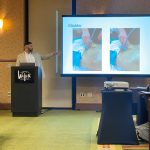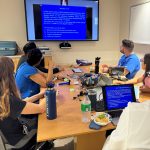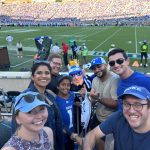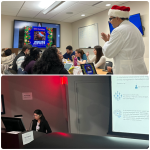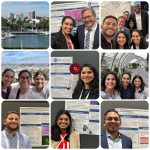Bi-Annual Reviews
First Year and Second Year Clinical Concentration Track Fellows:
You will meet with Dr. Sparks. The following items will be covered during your review. Please come prepared.
- Rotation evaluations
- Results of one completed KSAP module in the Winter or your ASN In-service exam in the summer (unless you have already taken the nephrology boards)
- All procedures logged in MedHub
- procedures required are-
- Kidney Biopsy (native and transplant)- (fellow logs medhub) OPTIONAL
- Temporary Dialysis Access Placement- (fellow logs medhub) OPTIONAL
- CRRT- (Dr Sparks will pull Epic data)
- PD
- inpatient PD orders- (Dr Sparks will pull Epic data)
- 8 PD clinics (fellow logs in medhub) REQUIRED BY ABIM
- 2 new start observations (fellow logs in medhub)
- Home Hemodialysis (fellow logs in medhub)
- Outpatient Dialysis Unit Rounding
- Minimum number of shifts is 12 (2 per month). These are required to be logged into MedHub
- POCUS (optional) (fellow logs in medhub)
- Pheresis (optional) (fellow logs in medhub)
- Kidney Biopsies- you should contact Dr. Musgrove on your outpatient immersion blocks and do them with him
- procedures required are-
- Bring a list of scholarly activity that is completed or in process (Included papers, online postings, book chapters, local or national committees, conference attendance, posters, oral presentations, invited talks, etc)
- Feedback on the program
- Discuss which track you will pursue (research or clinical conc)
- Think about what you want to do and results of your potential mentor meeting during the outpatient immersion weeks.
Second and Third Year Research Fellows:
You will meet with Dr. Sparks
The following items will be reviewed during your review. Please come prepared.
- Review Individual Development Plan (IDP) (download here)
- Rotation evaluations
- Results of one completed KSAP module (unless you have already taken the nephrology boards)
- All procedures logged in MedHub
- procedures required are-
- Kidney Biopsy (native and transplant)- (fellow logs medhub) OPTIONAL
- Temporary Dialysis Access Placement- (fellow logs medhub) OPTIONAL
- CRRT- (Dr Sparks will pull Epic data)
- PD
- inpatient PD orders- (Dr Sparks will pull Epic data)
- 8 PD clinics (fellow logs in medhub) REQUIRED BY ABIM
- 2 new start observations (fellow logs in medhub)
- Home Hemodialysis (fellow logs in medhub)
- Outpatient Dialysis Unit Rounding
- Minimum number of shifts is 12 (2 per month). These are required to be logged into MedHub
- POCUS (optional) (fellow logs in medhub)
- Pheresis (optional) (fellow logs in medhub)
- procedures required are-
- Bring a list of scholarly activity that is completed or in process (Included papers, online postings, book chapters, local or national committees, conference attendance, posters, oral presentations, invited talks, etc)
- Feedback on the program
General Responsibilities of All Fellows
- Patient Consults: Fellows and Residents must play a primary role in providing consultation and assistance in the management of patients, especially those needing dialysis or those who are recipients of kidney transplants.
- Daily Rounds on active patients. The Ward Staff expect and need our recommendations. Patients with active diagnostic and management problems need to be seen every day. On the weekends, be sure your cross-cover knows about the most pressing problems and will be familiar with them if called. It is extremely important for the attending and the other members of the consult team to actually visit the patients requiring decisions and to document that visit by completing a follow-up progress note.
- Student Education: Fellows and Residents are expected to devote time each week to the direct guidance and instruction of students on the service.
- Clinical Participation in continuity clinic at Duke and VA as assigned.
- Attendance at conferences. It is understood that patient care responsibilities occasionally require a fellow to miss a conference. We expect that fellows will attend at least 85% of the Core Curriculum Series, Journal Club and Grand Rounds conferences. Attendance is recorded.
- Participation in night and weekend on-call
- Supervision of emergency dialysis treatments. The details of this supervision may vary from on-site presence to immediate availability. The policy regarding emergency or on-call dialysis treatments is as follows:
- Fellow may leave the hospital if all patients to be dialyzed are hemodynamically stable.
- Fellow may leave the hospital if the only patients left to be dialyzed are routine (e.g. after permcath placement or graft de-clotting).
- Fellow must evaluate every dialysis patient who presents to the ER at night for dialysis (may not phone in dialysis orders based on ER evaluation).
- Any patient who initiates hemodialysis must be reviewed with the Attending.
- Preparation of individual Friday AM Clinical Conferences and Journal Clubs (see schedule).
- Communicating with outside dialysis units. When a patient on chronic dialysis is discharged from the hospital, the fellow is responsible for contacting the patient’s home dialysis unit and primary nephrologist to communicate the details of the stay along with any new changes in the dialysis orders, such as changes in dry weight or antibiotic therapy. There is a standard fax form for this purpose and sending an email to the appropriate attending for redundancy is encouraged.
- Evaluation of attendings. Fellows are required to provide an evaluation of the clinical attending at the end of each rotation. This is done through an on-line program. It should be completed within (5) days after the end of the rotation.
- Evaluation of Program: Fellows are required to provide an evaluation of the training program at the end of their first year of clinical training. This is an ACGME requirement.
When the Attending Faculty Member Should Be Contacted
These guidelines come with the understanding that the fellow should always use his/her judgment about this issue and certainly should call if there are any significant questions about management:
The attending should be called after the fellow or resident has evaluated a patient in any of the following situations:
- Patient is in the ICU or ED (unless consult is for maintenance HD and it is clear that HD is not required acutely)
- Patient has Acute Kidney Injury (unless electrolytes and volume are satisfactory, and it is clear that HD will not be required acutely)
- Electrolyte disturbance
- Patient has ESRD and a dialysis related problem other than request for maintenance HD, e.g. PC associated bacteremia, volume overload.
- Patient is on peritoneal dialysis
- Patient has had a change of status requiring kidney replacement therapy other than planned during previous encounter.
- Any new start for dialysis should be discussed with attending
These consultation issues require attending involvement acutely only if fellow or house officer desires attending input:
- Consultation for maintenance HD.
- Problems usually reserved for outpatient evaluation, e.g. longstanding proteinuria, HTN management after discharge.
Progression in Responsibility
Over the course of clinical training, three levels of proficiency are identified. During the initial period which may comprise as little as one week but as long as necessary, the fellow is considered to be in the Provisional Phase. During this time, the fellow is directly observed by the attending during at least one entire history and exam (using the mini-CEX) in the inpatient setting and as many femoral catheter placements as necessary before the attending is satisfied, using standardized criteria, that the fellow is competent to perform these tasks independently (but always with attending backup available). The second level of proficiency, is marked by successful achievement of the objectives delineated in the Goals and Objectives earlier in this document. On the Acute Service a third level is achieved when the fellow is able to essentially run the service with attending backup. Typically this would mean supervising the resident on the service, providing assistance with procedures, and general teaching, backed up by the attending in purely supervisory / observation mode. Achievement of this third level does not by itself imply successful completion of the program, a determination made using the full assessment system. The second year of training is focused on research for fellows pursuing an academic career, the 4th Phase of training, although all fellows do a minimum of 2 weeks of clinical work the second year. Additional clinical time may be scheduled and will definitely be scheduled if needed for competency. Fellows planning to enter practice after 2 years of training typically spend additional time on the clinical services, and may choose a concentration in transplantation, interventional nephrology, or another area of mutual choosing such as administration and public policy.





